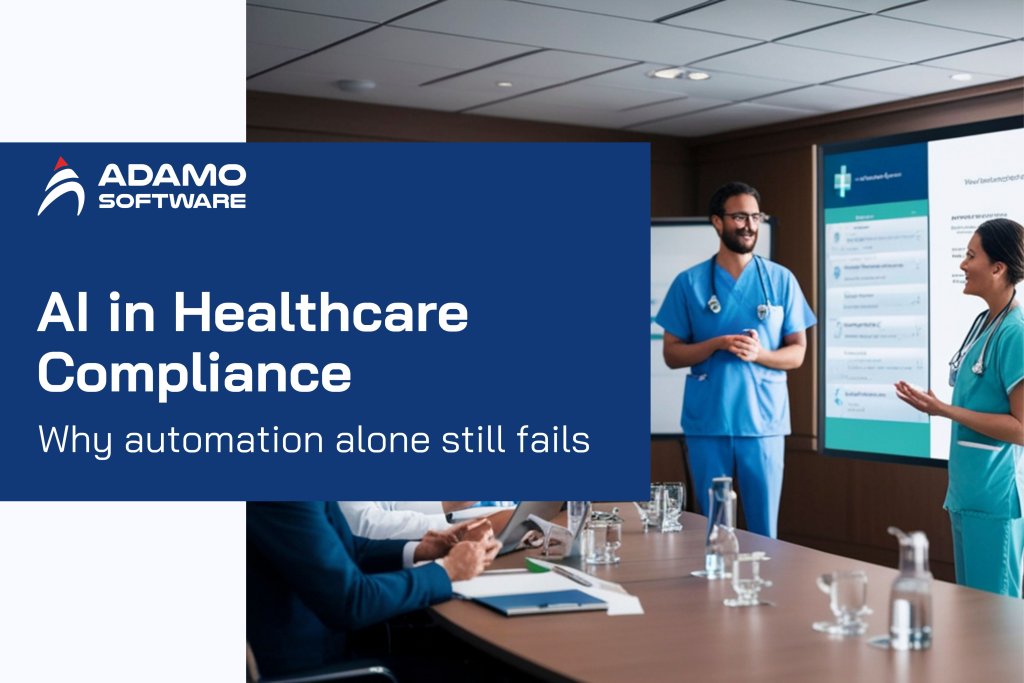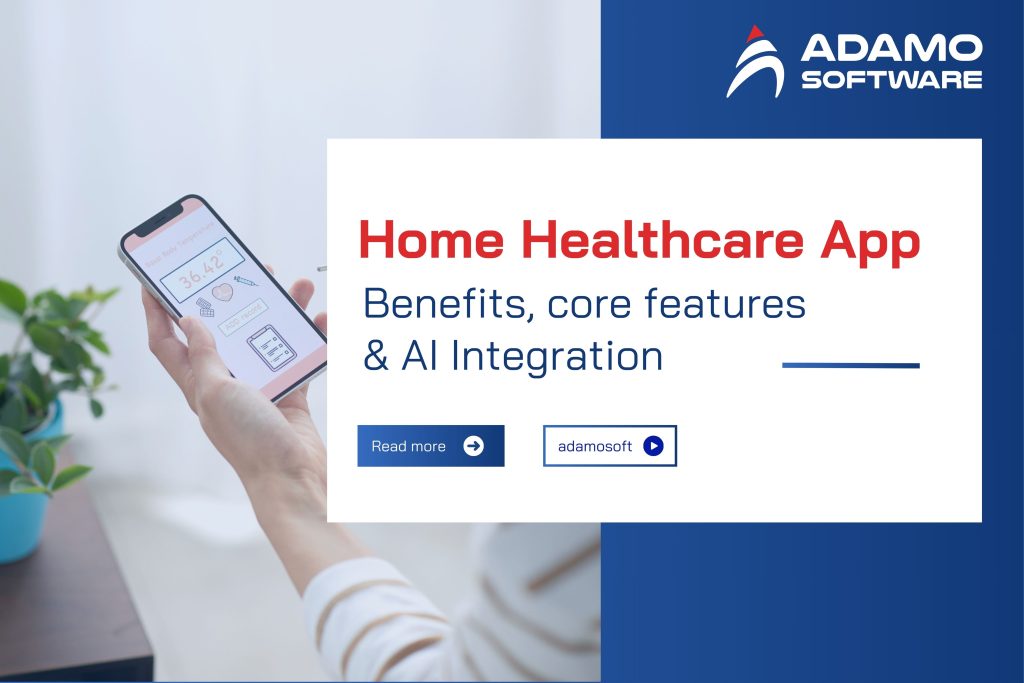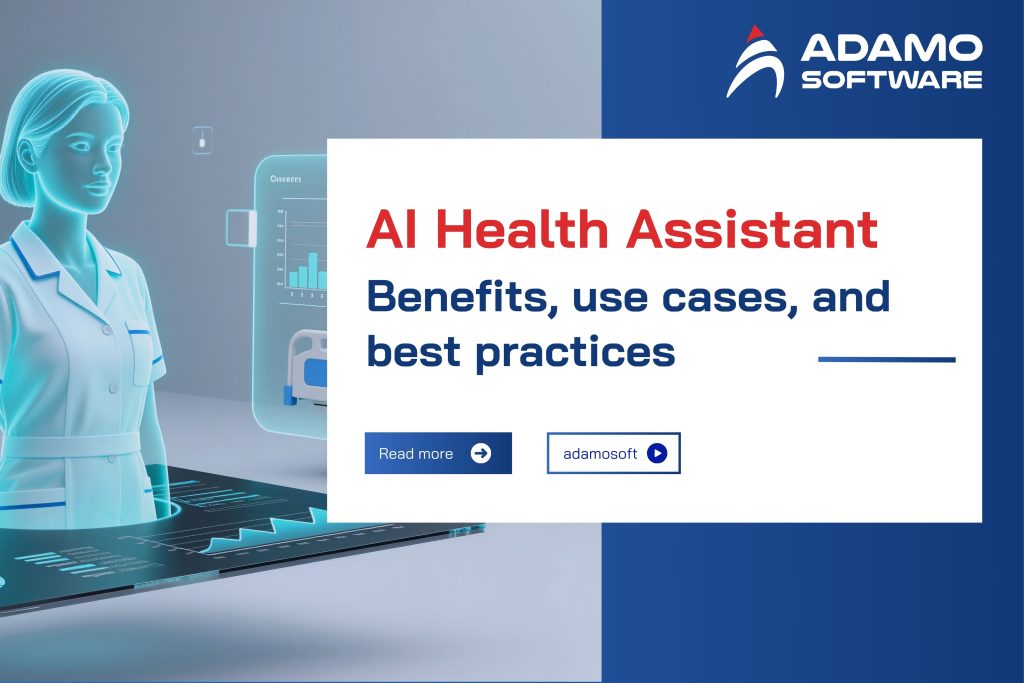Benefits of CRM in healthcare: Top features and selecting guidelines
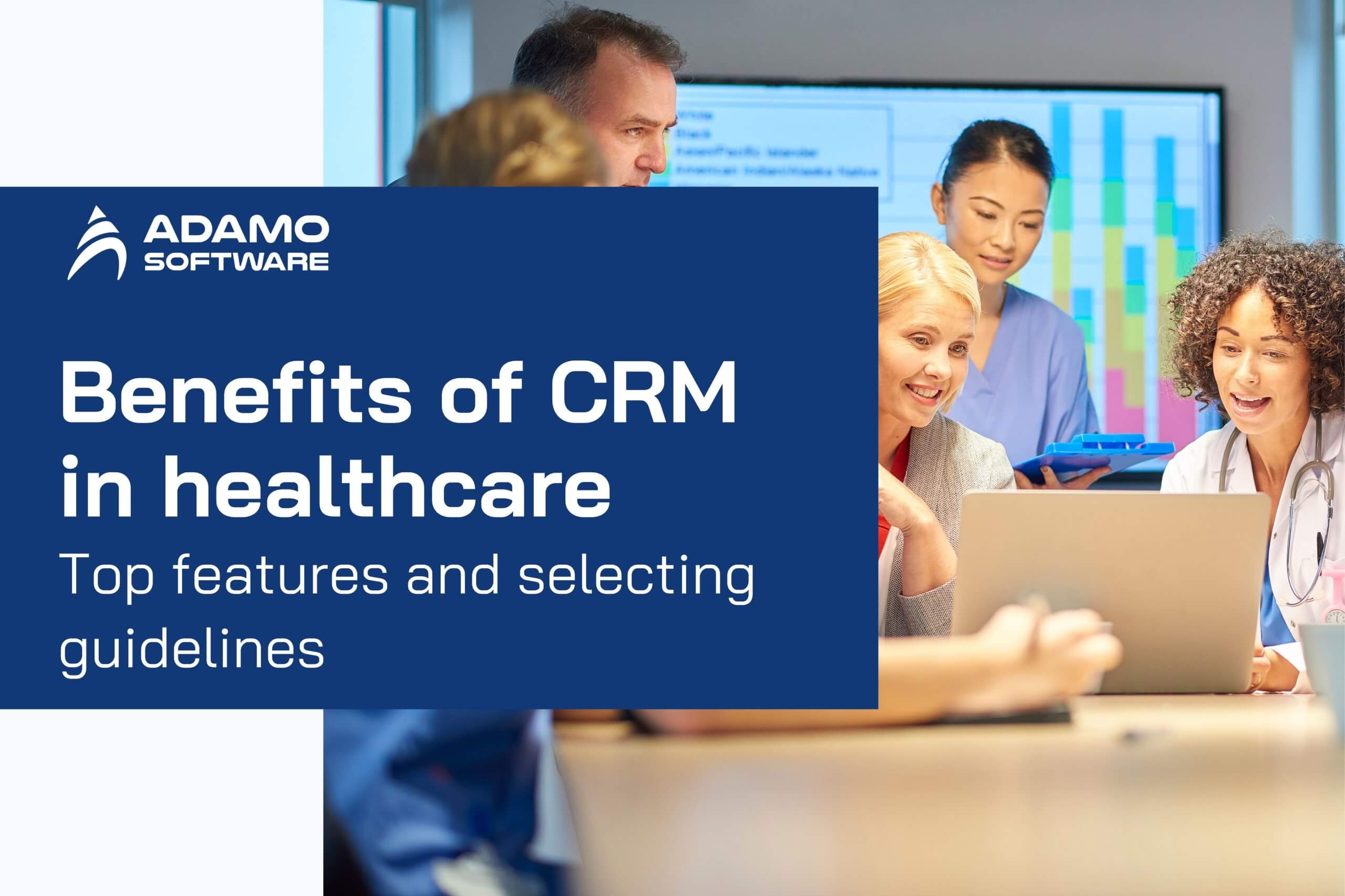
CRM assists caregivers in storing patient information and schedules and managing outgoing communication, enhancing the general patient outcome. Using CRM, medical professionals can gain better relational contact with the patient while properly aligning business processes.
Compared to other functional and beneficial systems, a healthcare CRM platform includes difficulties, and a proper assessment should be made. To gain the benefits of CRM in healthcare, its top features must be identified, potential issues and problems solved, and the appropriate platform selected. This indicates that patient record keeping, appointment, and communication tools make CRM vital for healthcare organizations. There is a way to deal with the mentioned issues and make the most of the chosen platform. You must pick the platform that will match your organization’s requirements. However, if the current CRM is adopted in healthcare, its benefits favor healthcare consumers and providers.
I. 10 top benefits of CRM in healthcare
These advantages of CRM in the healthcare sector reveal great value to the healthcare stakeholders. By delivering efficiency in tasks and upgrading patient care. Below are the top benefits explained in detail:
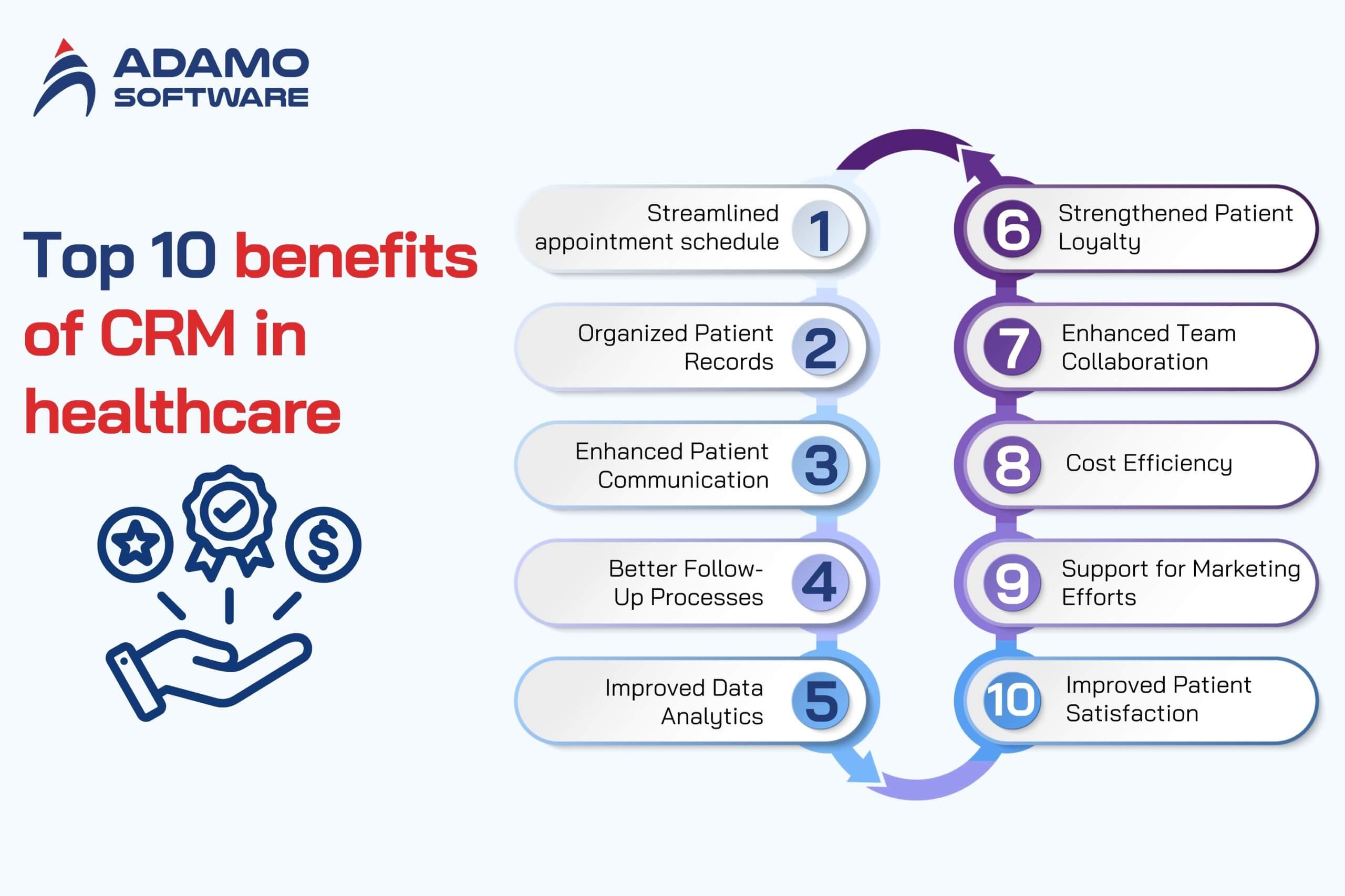
1. Streamlined Appointment Scheduling
Yet one of the facets of CRM in health care is the opportunity to use customer calendars for appointment settings. CRMs automatically eliminate double-booking incidences and help reduce the waiting time for appointment management. Appointments must be made or changed. Instead of taking up lots of time, the work can be centered on providing patient care. This makes the workflow a little easier for the patients and the providers in handling the patients.
2. Organized Patient Records
By nature, CRMs consolidate patient information in one location. Thus, every detail is a few clicks away from anyone with the right access level. This is one of the significant benefits of CRM in healthcare. It enables healthcare providers to gain quick access to patient’s histories, treatments, and test results. Having data in one place means no gaps within the patient’s health records, leading to the likelihood of errors being made.
3. Enhanced Patient Communication
The ability to communicate is one of the largest benefits of CRM in healthcare. Such frameworks provided tailored messaging to the patients. They can use features such as appointment and prescription reminders and calls to check on the patients after a certain period. Patients are emotionally bonded to their providers, which is the key to compliance with set treatment regimes.
4. Better Follow-Up Processes
Subsequently, CRMs are indispensable in follow-up appointments and essential for patients’ protection. Another benefit of CRM in healthcare is that it provides patients with automated notifications of follow-ups, check-ups, or other aftercare services. This reduces missed follow-up comments and enables the providers to follow up with patients’ progress.
5. Improved Data Analytics
Data analytics is important in demonstrating the benefits of CRM in healthcare. Through data analysis in terms of patients, treatments, and the organization’s overall performance, CRMs offer decision-making tools. Such analytics facilitate the identification of tendencies and future needs estimations. It optimizes decision-making in providing care for patients.
6. Strengthened Patient Loyalty
From the above discussion, it is quite clear that the benefits of CRM in healthcare are anchored on customization. Through giving relevant how-often information and immediate responses, CRM systems ensure patient trust and confidence. Engaged patients are sticky. Patient engagement prompts patients to remain loyal to a provider and continue using that provider in the future.
7. Enhanced Team Collaboration
Like in any other field, there is always a need to ensure that efficient teamwork is promoted. This is one of the areas in which CRM is likely to have advantages as it applies to the healthcare sector. CRMs enable many healthcare workers to work on the same patient file concurrently and make changes that will be simultaneously reflected to all. This enhances efficiency and leads to enhanced patient outcomes and satisfaction.
8. Cost Efficiency
Decreasing the operation costs is one of the realistic benefits of CRM in healthcare. Since functions like billing, scheduling, data entry, etc. If handled manually, they would require more human resources, harnessed through CRM. This in turn lets the healthcare organizations use the resources they have in the best manner possible.
9. Support for Marketing Efforts
CRMs are crucial for marketing within the healthcare industry. Another strategic advantage of CRM in healthcare is the triggering of specific patient databases for campaigns. For instance, providers can advertise wellness programs or order special checkups several times a year for the appropriate patients. Thus, they can attract more clients to practice.
10. Improved Patient Satisfaction
This way, all the factors connected to the utilization of CRM in healthcare come down to higher patient satisfaction. Right from scheduling appointments to planning patient care and follow-ups. CRMs guarantee that a patient right from the appointment booking stage has an easy time. This leads to an improved provision of feedback, more stimulating retention levels, and an improved image for healthcare institutions.
As with any improved system, utilizing these benefits of CRM in healthcare will provide a higher level of care to patients. At the same time, you can decrease operational costs while strengthening patient relations. In simple terms, implementing CRM systems is no longer a luxury but a necessity of the modern healthcare business.
You can explore more about Hospital Management Systems: Types, Key Features & Must-Know Insights here.
II. Drawbacks of CRM in healthcare
There are many benefits of CRM in healthcare, but it is equally important to learn about the evils of CRM too. There are, however, several issues that may accompany the application of a healthcare CRM system if it is not controlled correctly. Such drawbacks can make a difference to the platform operation and the extent it would align with an organization’s most important requirements.
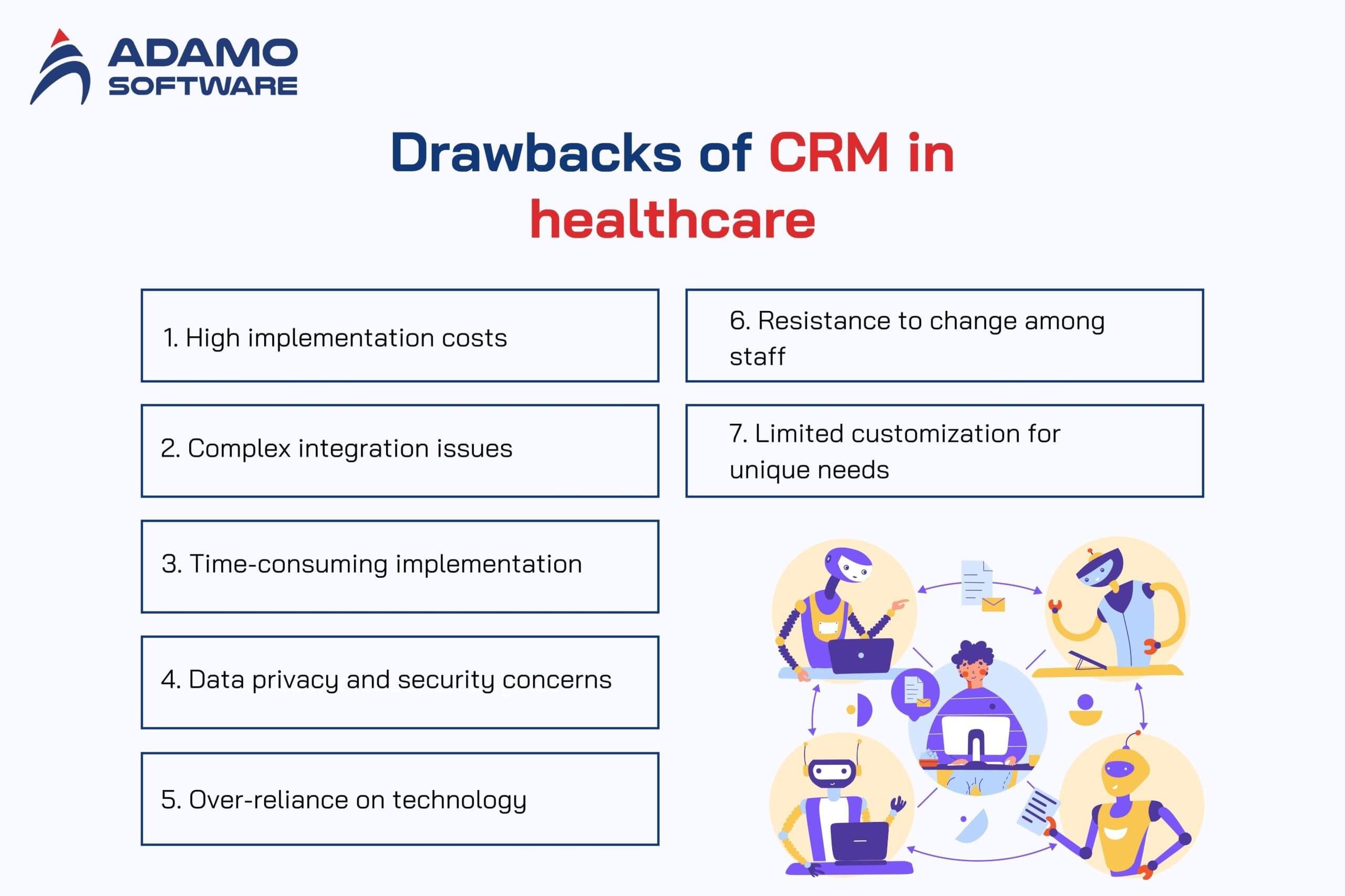
1. High Implementation Costs
A key latency of applying CRM in healthcare is the expense incurred when integration. Acquiring the system, implementing it over existing systems, and educating human resources demands a lot of money. In particular, smaller healthcare organizations may find these costs prohibitive. Though there may be costs, the benefits of CRM in healthcare may far surpass them.
2. Complex Integration Issues
Implementing a CRM system with other health IT like EHRs or patient management systems may be challenging. When the CRM platform is incompatible with the other tools, it can create complications that affect the CRM and other business tools. This can sometimes minimize the total impact that might be brought about by implementing CRM in healthcare.
3. Time-Consuming Implementation
Establishing a healthcare CRM system needs a lot of time and energy. From defining configuration to employee training, it can interfere with organizational operations. Without adequate thought, the big change may become a major problem that will stop organizations from fully utilizing CRM in healthcare.
4. Data Privacy and Security Concerns
Healthcare CRMs handle patient information, putting them at risk of being attacked by hackers. It can be difficult to guarantee that the system meets various data protection regulation standards such as HIPAA. RM & CRM in healthcare can suffer from a security breach that will negate the positive impact of CRM on trust. Legal consequences and reputations can be damaged.
5. Over-Reliance on Technology
The final disadvantage of managing CRM in the healthcare industry is the over-dependence on technology. Although the main idea of an automated system is effective. The conclusion of such a method may partially or completely minimize the touch in patient care. Thus, CRM benefits in healthcare cover the enhancement of communication. However, applying such reliance can belittle human interactions.
6. Resistance to Change Among Staff
Employees may choose not to embrace a new CRM platform because they lack knowledge, and the new technology will complicate their work. Such resistance can slow down the implementation. It can also lower the degree of actualization of the benefits of CRM in the healthcare sector. Therefore, it is important to ensure that training is given adequate attention and communication.
7. Limited Customization for Unique Needs
The limitation of this kind of healthcare CRM system is that it may not give flexibility that fits the organization’s needs. A wrong choice of CRM can disadvantage CRM in healthcare since a CRM may not fit the provider’s work or objective.
Despite these concerns, it must be noted that most concerns are mitigatable, provided one takes significant quantities of time and effort to plan. Carefully choose the platform most suitable for its needs. Ensure its staff are trained on the various tools and platforms in question. It is necessary to consider these restrictions to maximize the benefits of CRM in healthcare and achieve successful results of CRM’s application in practice.
III. Essential Healthcare CRM features to consider
We will guide you on how to select the best CRM system to achieve the benefits of CRM in healthcare. Healthcare CRM should help to optimize processes, enhance patients’ satisfaction, and facilitate a decision-making process. Below are the key features that make a CRM effective in meeting the specific needs of healthcare organizations:
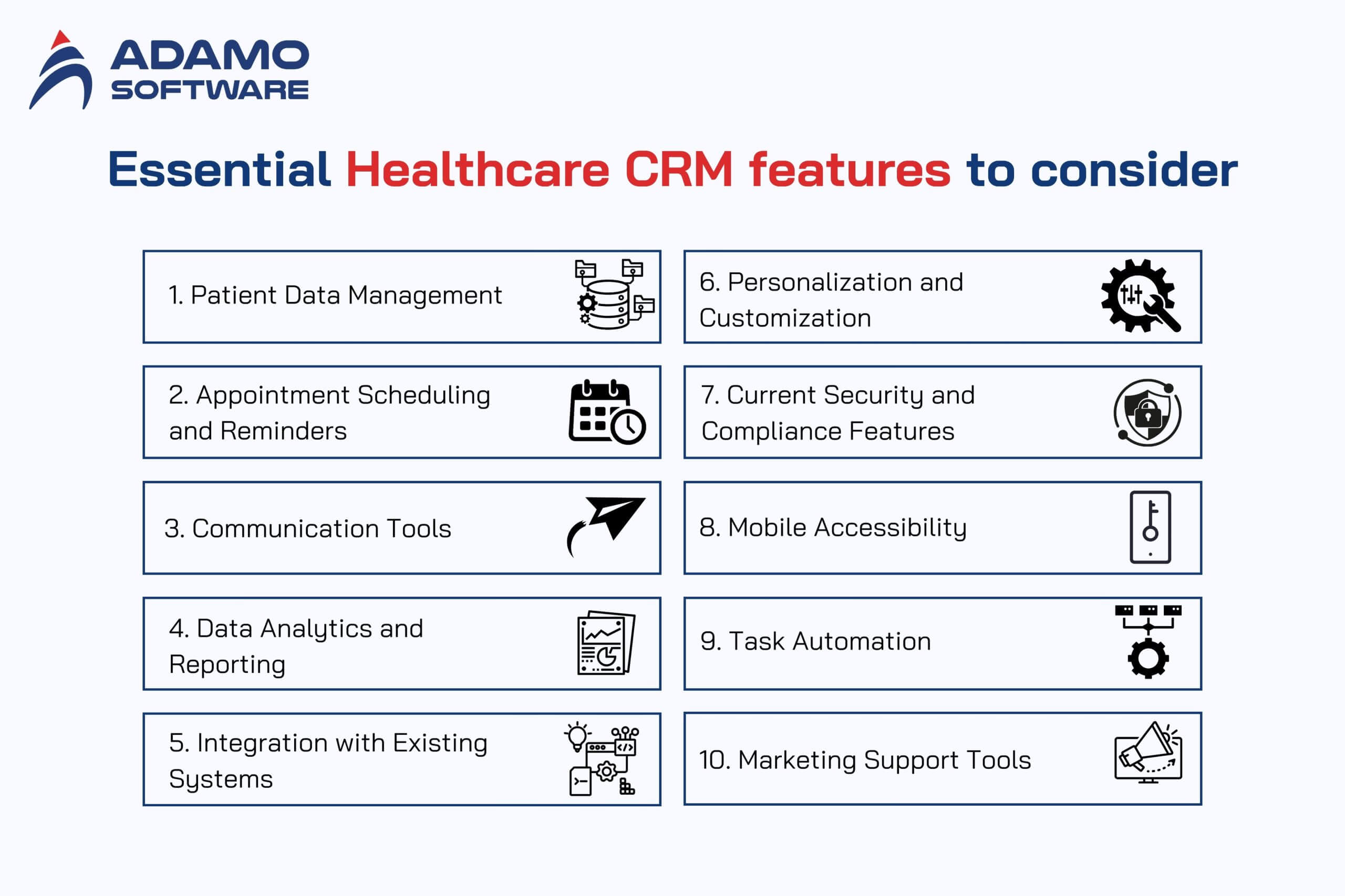
1. Patient Data Management
The CRMs of the healthcare industry must meet customer data management standards. They should contain comprehensive records about the patients and their treatments. This feature is the cornerstone of the benefits of CRM in healthcare. This is because it brings together the patient data. Hence, it facilitates individual attention and instant decision-making.
2. Appointment Scheduling and Reminders
Shedding emphasis on integrating automated scheduling into the healthcare CRM system is also a necessity. This feature enables the patient to make appointments, and change, or cancel an online appointment. It also reminds patients of their appointments so they will remember to show up. Thereby, it helps providers manage their time effectively. These tools add up the operational benefits of CRM in healthcare by having a time-effective strategy and efficient service delivery.
3. Communication Tools
Business communication is one of the key advantages of using CRM in the healthcare sector. Specific activities like email updates and reminders, text, and a patient portal assist in updating patients on their care. They help keep healthcare providers communicated and distinct. Thus, they enhance their interaction with patients and the overall satisfaction formed.
4. Data Analytics and Reporting
Analytics capabilities at the more advanced levels of system implementation enable healthcare providers to categorize treatments and outcomes. They can view trends and compare their organizations’ performance. Thus, it allows for making the right choices and enhancing services in organizations. This feature completes the benefits of CRM in healthcare. It converts the data into a useful course of action.
5. Integration with Existing Systems
A good healthcare CRM should complement EHR and other healthcare tools. This saves time as data transferred between the two platforms is consistent. Thus, it cuts down on the time used for rectification. The lack of this feature may, however, hinder comprehensive CRM in healthcare simply because operations may be conducted in silos.
6. Personalization and Customization
Since every healthcare provider is different, a CRM must be adaptable. Customizable templates, personalized dashboards, and malleable processes guarantee that the system meets particular organizational requirements. This customization helps to increase the benefits of CRM in healthcare by meeting the perceived or assumed needs of both sides.
7. Current Security and Compliance Features
Patient data is rather sensitive. Healthcare CRM must have effective security for data encryption and role-based security. Regulations like the Health Insurance Portability and Accountability Act, commonly known as HIPAA, should be followed. This is to avoid a breach of the patient’s right to privacy. Strong systems support trust, which is critical for the outcomes of CRM in health care to be fully gained.
8. Mobile Accessibility
Mobile access means that a CRM provides caregivers with information about the patients, communication, and task-handling functions regardless of location. This flexibility boosts the benefits of CRM in healthcare as a way of bridging the extra care delivery centers.
9. Task Automation
Mobile interfaces include reminder/follow-up notifications and billing, which are less taxing for staff regarding the time required. This has increased efficiency to a level where providers can spend more time with the patients. This paper has shown that task automation is crucial in realizing the operational gains of CRM in healthcare.
10. Marketing Support Tools
Further, some features to be added to the healthcare CRM are tools that separate the patient’s data for further targeted campaign and marketing results tracking. These features will enable any healthcare practice to expand its business and attract customers’ loyalty. This brings, even more, from a business perspective to the benefits of CRM in healthcare. Hence, it becomes a worthy tool for business development.
Choosing a CRM with these essential features ensures healthcare providers can deliver what patients need from them in terms of care and efficiency. Hence, organizations must concentrate on the right features to enhance the benefits of CRM in healthcare before the competition gets out of hand.
IV. How to choose the right healthcare CRM platform
Choosing the best CRM system is crucial for the success of CRM in healthcare organizations. A good CRM system enhances patient care, improves efficiency, and helps make better decisions. To achieve that, you need to review your organization and understand the various available platforms. Here are some key factors to consider:
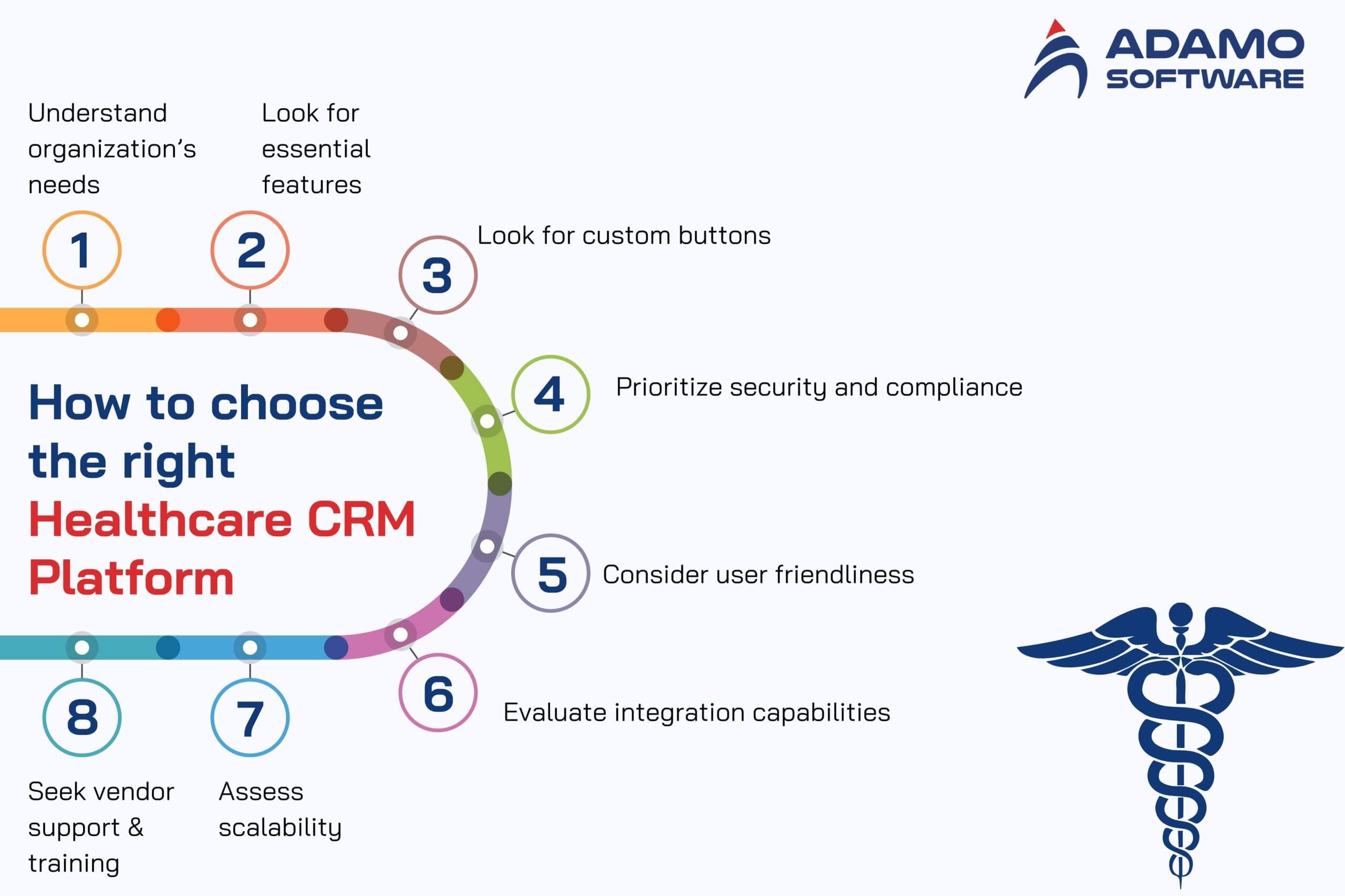
1. Understand Your Organization’s Needs
The first step is to distinguish between your objectives and problems. Do you want to enhance your ability to communicate with patients, synchronize your schedules, or measure the analytics? This means understanding your needs so that the CRM platform you end up with meets those needs. It is crucial to adopt comprehensive and realize the benefits of CRM in healthcare. It is also helpful for understanding the addition of value to your operations.
2. Look for Essential Features
Select a CRM with modules such as patient information management, scheduling/reminder of patients’ appointments, and altering with other informational systems. For instance, the electronic health record systems. These features help to maximize the benefits of CRM in healthcare as it integrates various workflows and provides a cohesive structure to the data. Do not exclude such additional features as data analysis, marketing assistance, and application availability on a mobile platform.
3. Look for Custom Buttons
Healthcare organization needs may vary, and an appropriate CRM should be easily customizable. Flexibility means that specific goals can have a dashboard, workflow, and templates designed specifically to address them. Customization improves the gains of CRM in health care since the platform is fitted to suit business processes.
4. Prioritize Security and Compliance
Protection is one aspect that cannot be compromised for any healthcare CRM out there. Ensure that the platform fully adheres to the guidelines of the Data Protection Act. The platform should meet the requirements of secure data processing. They include encryption, access rights, and storage area. It is critical to ensure patient data safety. Therefore, CRM is central to enhancing patient care.
5. Consider User Friendliness
A user-friendly CRM platform is easy to use, so the staff will not spend time learning how the system works. This is why healthcare system employees must be able to easily relate to the aspects used in the system. Therefore, maximum gains can be obtained from CRM without introducing much interference. Demand also samples with which to test its functionality before subscribing to the platform.
6. Evaluate Integration Capabilities
The CRM should fit well with your current healthcare structures, like the appointment calendar or billing system. When unwell implemented, it leads to operational disadvantages where CRM is underutilized in healthcare. Ensure that the CRM will work well on all platforms and that all data transfers and integrations are seamless.
7. Assess Scalability
Another consideration when choosing a CRM tool is how good the CRM is when handling integrated growth with output healthcare organizations. Select one that would accommodate more patients, new functionalities, and more team members in the future. In healthcare, scalability enhances the future value of CRM, as opposed to frequent replacements or upgrades owing to inefficiency.
8. Seek Vendor Support and Training
Choose a CRM supplier that will provide technical support and training services. They also pointed out that adoption, proper exercise, and subsequent support assist the staff in getting the most from the system. Good support means that you make the most of CRM in healthcare and mitigate any problems that may arise on the way.
When making these choices, your organization can get the proper healthcare CRM location that will improve the patient care that you offer. Thus, when a suitable platform for CRM in healthcare is established, this system can enhance efficient healthcare delivery. It can also increase patient satisfaction and sustain success.
V. Make Use of the Benefits of CRM in Healthcare with Adamo Software
To assist healthcare providers in achieving the maximum benefits of CRM in healthcare, Adamo Software provides personalized CRM healthcare software development solutions. We optimize patients’ flow and communication processes and offer the necessary information about the effectiveness of the activities performed.

In short, Adamo Software offers comprehensively secure, effortlessly scalable, and compliant systems to healthcare organizations that must provide unique solutions and stand the test of time. Providers can make CRM in healthcare even more effective by increasing patient satisfaction and improving working processes.



